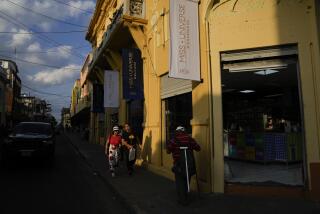Baghdad’s tepid nightlife
Cops stormed in and shut the place down. Up the stairs and out into the warm spring night the tipsy customers stumbled, along with a gaggle of ladies of the night, various shady characters, the singer and his band.
A rustle of umbrage. What’s the meaning of this?
The police almost apologized. Orders from the Interior Ministry, they said, one of the higher-ups.
But one of the customers was also in the Interior Ministry. He pulled out his cellphone and called someone, an even higher higher-up. And 90 minutes after one of Baghdad’s most notorious nightclubs was closed, the whiskey was flowing, the young women dancing, the sound system pumping out Arabian rhythms so loud they shook the wood paneling.
“Someone with big influence calls someone with bigger influence,” one of the guests, who goes by the name of Abu Hassan, explains a few nights later. “Every night it is something.”
So it goes in Baghdad’s clubland, reemerging from years of war and Islamist fervor.
Abu Hassan has allowed a Western reporter to join his entourage at the club on condition that he not identify himself as a journalist to the nervous owner, who isn’t around, or his many brawny guards and bouncers, who signal to one another using laser pointers amid the haze of smoke and loud music.
Guests start arriving at 9 p.m., paying a cover charge of either $20 or $40, depending on the night of the week and the entertainment. Security guards pat down the guests for weapons.
“If the guy at reception likes him, he gets inside,” says Abu Hassan, whose son sings at Baghdad nightclubs. “If he doesn’t, he doesn’t get in.”
The staircase leads to a large hall filled with the smell of stale cigars and cigarette smoke. A layer of dust coats the wall-to-wall carpeting. The sound system pumps out a loud pop song about heartache and longing.
“Every time you make a date, you break it,” the song goes. “Too much bitterness because of you.”
A waiter hovers near the guests sitting in red velvet chairs, taking drink orders. The choices are limited: Whiskey or beer.
“No vodka or gin,” Abu Hassan says. “They have a bad effect on the brain.”
A singer croons as a keyboardist rotates the same melodies on a pair of synthesizers stacked atop each other and a percussionist bangs out beats on a small drum. “The charge on your heart is getting low, and you’re getting tired,” he sings.
Of course, clubland in any town isn’t just about liquor and music. It’s also about sex, or at least its possibility.
The women arrive in one group shortly after 9. There are five, all wrapped in black abayas, which they strip off to reveal elegant form-fitting gowns and silvery belts around their waists.
They are young; all appear to be in their late teens and early 20s. Except for an older woman wearing a black head scarf who is described as their “mother,” there are only men in the club.
Abu Hassan says the young women are prostitutes, used by the club to draw in customers. When the rhythms kick up, they saunter over to the stage. They chew gum and stare off into the distance as they wiggle their hips and wave their arms in a bored parody of an Oriental dance.
The men are older, beefy with thick mustaches, dyed black hair and ill-fitting sports jackets. They wipe sweat off their brows with tissues from the pink boxes placed on each table.
They ogle the women, and when the spirit (or the effect of the alcohol) moves them, a few stand up and begin dancing themselves, approaching the young women flirtatiously. Others sit at their tables and summon the women over by waving wads of cash.
Hannadi, who says she’s 17, wears tight pants, a strapless top and a silver ornamental belt. She’s here every night, she says, but declines to answer a lot of questions, hurrying back to the dance floor.
“Come back again,” she says, “and I promise to talk more.”
Times staff writer Usama Redha contributed to this report.
More to Read
Start your day right
Sign up for Essential California for news, features and recommendations from the L.A. Times and beyond in your inbox six days a week.
You may occasionally receive promotional content from the Los Angeles Times.






